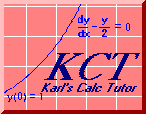

Taking this derivative can be done pretty much in one step. Let
g'(x) = 1
h'(x) = cos(x)
-1
u'(x) =
If
x2
f'(x) = g'(x) h(u(x)) + g(x) h'(u(x)) u'(x)
Now, substituting back the functions and derivatives for
g(x), h(x), and u(x), we get
-1
f'(x) = 1 × sin(1/x) + x cos(1/x)
or simply
x2
cos(1/x)
f'(x) = sin(1/x) -
And what can you say about it at
x
email me at hahn@netsrq.com